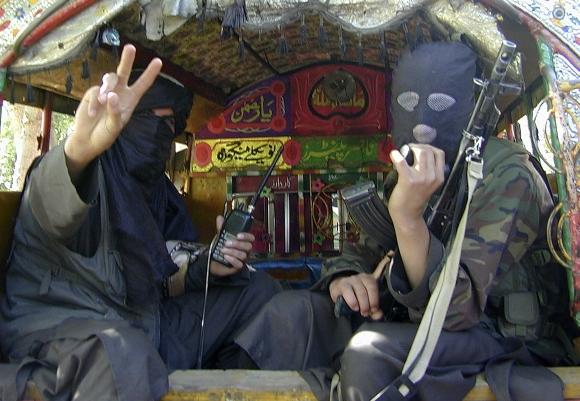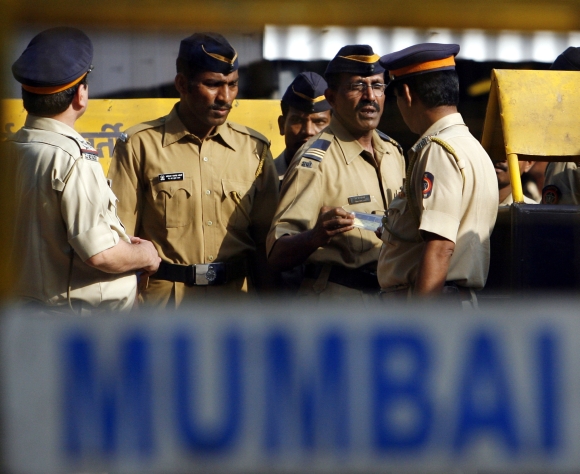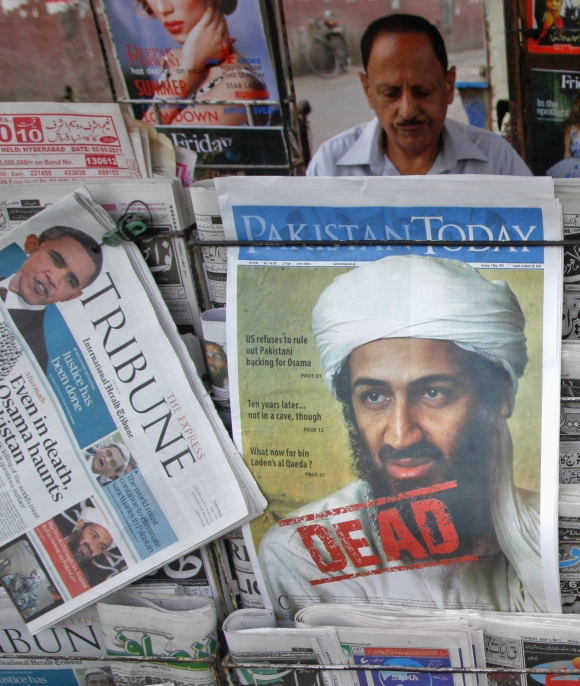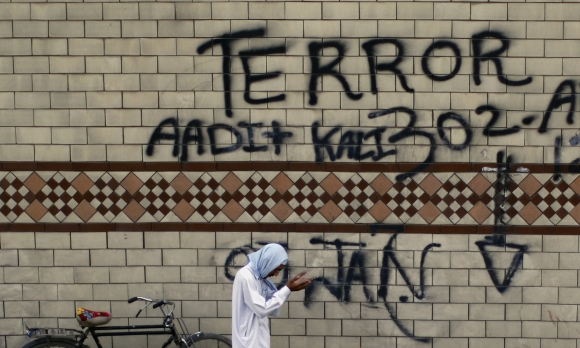
Will it confront the dangers posed by Pakistan's unsecured nuclear programme, asks Nikhil Lakshman, currently in the South Korean capital.
It is a sweltering summer day. Truckers caught in the traffic on the bustling highway from Multan to Rawalpindi swear at the heat and mull over the convoy of seemingly unconnected trucks traveling the other way from the garrison town where the Pakistan army has its headquarters to the bustling city in the Punjab. 'They don't look like truckwallahs,' one driver tells the cleaner, sitting alongside, digging his nose. 'They look fauji.' Suddenly, out of almost nowhere it seems, a gaggle of pick-up trucks and SUVs block either end of the 'fauji' convoy. Shooting breaks out between the men in the trucks and the men in the pick-up vehicles. The exchange of fire continues for several minutes. Traffic halts instantaneously. People take cover. Even in Pakistan where gunfire is a daily occurrence these days, the vehemence of the encounter is startling. When the firing stops, men from the pick-up trucks emerge, wearing radioactive- protective uniforms. They seem to know what they are looking for, quickly entering one of the trucks and taking away what appears to be a small canister. As they race to the SUVs, one of them tosses grenades into the trucks. The entire operation takes less than 15 minutes. As military helicopters emerge over the horizon, the SUVs vanish. The first nuclear heist has just taken place...
Fiction yes, but for how long?
As 50 of the world's leaders gather in Seoul, South Korea, on Monday and Tuesday for the second Nuclear Security Summit, the nightmare that Pakistan's nuclear arsenal could be stolen by terrorists and used to mount an attack -- no prizes for guessing on which country -- is truly terrifying.
Click on NEXT for more...

On March 20, the Nuclear Threat Initiative, a group dedicated to the study of the threats posed by vulnerable atomic arsenals worldwide, noted, 'The consequence of a nuclear terrorist attack -- whether in Tokyo or Tel Aviv, Mumbai or New York -- are almost unthinkable. World leaders in Seoul should take important steps to ensure that such a catastrophe never happens.'
In his feature on Pakistan in The Atlantic magazine – 'The Ally From Hell' – Jeffrey Goldberg quotes Graham Allison, an expert on nuclear weapons at Harvard's Belfer Centre for Science and International Affairs as saying a terrorist theft of a weapon which they could take to Mumbai or New York and trigger off a nuclear 9/11 is among the three major fears about Pakistan's nuclear programme.
In 2010, United States President Barack Obama invited 46 heads of government to Washington, DC for the first Nuclear Security Summit, the largest number of world leaders who gathered on American soil since 1945.
As the Belfer Center noted, Obama wanted to focus world leaders' minds like a laser beam on what he identified as the 'single biggest threat' -- nuclear terrorism
All 46 leaders agreed to secure 'vulnerable nuclear material worldwide from the reach of thieves and terrorists within four years. Among the leaders was Prime Minister Manmohan Singh -- whose presence at the summit, South Asia expert Dr Ashley Tellis then noted on Rediff.com, 'epitomises the support of a key country that along with the US and Israel would be among the most likely victims of nuclear terrorism should the summit's objectives not be realised.'
Also present was Pakistan's Prime Minister Yousaf Reza Gilani whose country has the fastest growing nuclear weapons programme in the world!
The Nuclear Security Summit is not country specific. It did not discuss the many threats to Pakistan's nuclear weapons in Washington and it is unlikely the meeting in Seoul will do so, at least externally -- even though as Matthew Bunn, Eben Harrell and Martin B Mallin noted in their eve-of the second-NSS report released on Friday, 'Pakistan's nuclear assets face a greater threat from extremists seeking nuclear weapons than any other stockpile on earth.'
Click on NEXT for more...

Afer Osama bin Laden was killed last May, Pakistan's army chief General Ashfaq Parvez Kayani summoned retired Lieutenant General Khalid Kidwai to his office.
Kidwai heads Pakistan's Strategic Plans Division, which is the central authority to protect Pakistan's nuclear arsenal. Some Western observers rate Kidwai highly and believe his professionalism has averted a catastrophe thus far.
According to an account in The Atlantic, Kayani did not want to know if Pakistan's nuclear weapons – which number at least 100 by most accounts -- was protected from the jihadis.
The general wanted to know if Kidwai could assure him that Pakistan's nuclear weapons was safe from any likely American assault in the aftermath of the tense standoff following bin Laden's death.
Kidwai, The Atlantic noted, told Kayani -- who incidentally superseded him when he became army chief -- that the Strategic Plans Division was 'focused on rooting out American and Indian spies from the Pakistan nuclear weapons complex.'
Before he flew to Seoul for the Nuclear Security Summit, Kidwai, Pakistan's Ambassador to China Masood Khan, who is his country's chief negotiator on nuclear security, and other senior officials and generals briefed Yousaf Reza Gilani on Pakistan's nuclear security which the prime minister later declared was 'excellent.'
Despite that endorsement, six of Pakistan's known 15 nuclear installations have come under attack from the jihadis at different times, US Congresswoman Michele Bachmann revealed last year.
On Saturday, a senior Indian government official told reporters, "Pakistan's nuclear programme gives us very little confidence that it will remain secure."
One big concern, the official felt, was the "insider threat," the fear that someone in Pakistan's vast nuclear establishment would be involved in the theft of nuclear material and hand it over to terrorists.
Think that is far-fetched? Think again.
Click on NEXT for more...

Soon after 9/11, the US discovered that two Pakistani nuclear scientists, Dr Sultan Bashiruddin Mahmood and Dr Chaudhary Abdul Majeed, had met with Al Qaeda leaders many times since the two men founded an organisation -- the Ummah Tameer-e-Nau -- to aid development and relief in Afghanistan since June 2000.
The Pervez Musharraf regime scoffed when the Americans highlighted their concerns, but caved in later and picked up both men, kept them in prison for several months and supposedly tried to detect the extent of their involvement with Al Qaeda.
The Washington Post reported on December 12, 2001 that a month before 9/11 both nuclear scientists had had 'long discussions' with Al Qaeda about nuclear, chemical and biological weapons. One of the men Mahmood and Majeed met was Osama bin Laden who wanted their help in building a nuclear weapon.
Though Mahmood had led a large reactor project and there was damning evidence about their dubious roles, both men were eventually released without charges being pressed against them. Mahmood and Majid were allowed to fade from view into retirement, and no one to this day knows if the know-how they provided Al Qaeda is floating somewhere in that organisation's archives, waiting for that moment when it is in possession of sufficient nuclear material.
Mahmood believed Pakistan's nuclear know-how was the property of not his country, but the entire Muslim world, the Ummah, which he was so obsessed with. No one knows for certain if any of the 70,000 people estimated to be employed at Pakistan's nuclear complex -- including 7,500 scientists, 2,000 of whom have the critical expertise to build a bomb -- share Mahmood's views.
General Khalid Kidwai has claimed his Strategic Plans Division screens all employees and new applicants, monitors their bank accounts and foreign trips regularly, and follows up on meetings they could have with anyone classified as an extremist.
According to The News newspaper, Pakistan's defence ministry says it is training 8,000 'handpicked officers and men who are physically robust, mentally sharp and equipped with modern weapons' to protect its nuclear arsenal.
The Pakistanis, who are as slick with their messages as snake-oil salesmen are, also claim that their command and control over its nuclear weapons is based on something dubbed as 'C4I2SR': Command. Control. Communication. Computers. Intelligence. Information. Surveillance. Reconnaissance (The News).
But Pakistan's nuclear security is designed at the wrong threat. Over and over, General Kidwai has highlighted that his country's n-arsenal is hidden in underground facilities which the Indians and Americans have no clue about.
The Indians and the Americans, it appears, are what the general mostly worries about, not an insider in the Pakistani nuclear establishment who believes that an atomic bomb, no matter how crude, should be used against the enemies of Islam.
In his feature for The Atlantic, Jeffrey Goldberg noted how Pakistan transported its nuclear material in unmarked, everyday, vehicles; this, the Pakistanis believe, provides greater security rather than an obvious military convoy which could come under attack from that nation's many terrorist groups.
But who is to ensure that the information about such transportation remains confidential and is not passed onto inimical forces by sympathisers in the nuclear establishment (hence, the fictional scenario outlined in the first slide of this feature).
As the Belfer Center noted about Pakistan in its report 'Securing The Atom', 'Despite extensive security measures, there's a very real possibility that sympathetic insiders might carry out or assist in a nuclear theft or that a sophisticated outsider attack (possibly with insider help) could overwhelm the defences.'
After the end of the Cold War, America obsessed about the nuclear material and weapons floating about in the old Soviet Union and spent billions of dollars these last 20 years to successfully (so far, at least) prevent it from falling into the hands of terrorists.
Pakistan has a combustible, lethal mix -- over a hundred nuclear weapons; plenty of spent fuel (all it needs is between 40 and 50 kilos of Highly Enriched Uranium to build a crude gun-type atomic device); scientists with the knowledge and likely sympathies that could easily be used to help build a bomb if the nuclear material was available and, of course, the most intelligent and sinister terror networks operating anywhere in the world.
The second Nuclear Security Summit, which opens in Seoul on Monday, will, unfortunately issue a bland communique with no specific mention of the most dangerous threat to the existence of the world as we know it -- the risks posed by Pakistan's unsecured nuclear programme.
Click on NEXT for more...